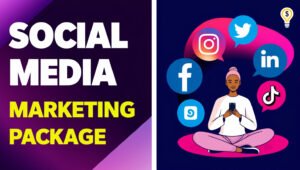
Introduction to Social Media Marketing Resumes
In today’s digital world, a strong resume is key to landing a job in social media marketing. Whether you are a seasoned professional or just starting out, your resume needs to stand out. You need to showcase your skills and experience effectively. A well-crafted resume helps you grab the attention of employers. It tells them why you are the right fit for their team.
In this article, we will guide you through creating an impressive social media marketing resume. You will learn what to include, how to highlight your achievements, and the common mistakes to avoid. Let’s dive in and make your resume shine!
2. Types of Social Media Marketing Roles
Social media marketing encompasses a variety of roles, each with its own focus and responsibilities. Understanding these positions can help you tailor your resume to match the specific job you’re applying for. Here are some of the most common roles in social media marketing:
1. Social Media Manager
A Social Media Manager oversees a brand’s presence on various platforms. They create content, manage posts, and engage with the audience. Their goal is to build a strong online community and enhance brand awareness. In your resume, emphasise your ability to develop strategies and analyse social media metrics.
2. Social Media Coordinator
The Social Media Coordinator supports the manager by planning and scheduling content. They often help with campaigns and monitor engagement. If you’ve held this role, highlight your organisational skills and experience with content calendars.
3. Social Media Strategist
A Social Media Strategist focuses on developing comprehensive strategies to achieve marketing goals. They research trends and analyse competitors to create effective campaigns. When detailing your experience, showcase your strategic thinking and data analysis skills.
4. Content Creator
Content Creators produce engaging visuals, videos, and written posts for social media. They must be creative and understand the audience’s preferences. If you have experience in this area, mention specific projects that demonstrate your creativity and ability to engage followers.
5. Social Media Analyst
Social Media Analysts focus on data and metrics. They track performance, analyse trends, and provide insights to improve strategies. If you’ve worked in this role, emphasise your analytical skills and experience with social media tools.
6. Community Manager
A Community Manager builds and maintains relationships with the audience. They respond to comments, handle customer inquiries, and foster a positive community atmosphere. Highlight your communication skills and experience in community engagement on your resume.
7. Social Media Marketing Consultant
Consultants advise businesses on their social media strategies. They may work with multiple clients to enhance their online presence. If you have this experience, emphasise your ability to tailor strategies to meet specific client needs.
8. Social Media Influencer
Influencers leverage their personal brand to promote products or services. They often have a dedicated following and create authentic content. If you’ve worked as an influencer, detail your engagement rates and successful campaigns.
Each of these roles requires a unique skill set and focus. When applying for a position, carefully read the job description and align your resume with the role’s requirements. This will show potential employers that you understand the specific needs of their team and can bring value to their social media marketing efforts.
3. Essential Resume Sections

When crafting a resume for a social media marketing role, it’s crucial to include specific sections that effectively showcase your qualifications. Each section should be clear and tailored to highlight your strengths. Here are the essential components of a strong social media marketing resume:
1. Contact Information
Start with your name, phone number, email address, and LinkedIn profile. Make sure this information is easy to find. You can also include your location (city and state) if relevant to the job. Avoid using unprofessional email addresses; a simple format using your name works best.
2. Professional Summary
This section is your chance to make a strong first impression. Write a brief summary (2-3 sentences) that highlights your experience, skills, and what you bring to the table. Focus on your key achievements and what sets you apart. Use action words and be specific about your expertise in social media marketing.
Example:
“Results-driven social media manager with over 5 years of experience in developing successful marketing strategies. Proven track record of increasing engagement and driving brand awareness across multiple platforms.”
3. Work Experience
Detail your relevant work history in reverse chronological order. For each position, include your job title, the name of the company, the location, and the dates of employment. Use bullet points to describe your responsibilities and achievements. Quantify your results when possible, such as “Increased social media engagement by 40% in six months.”
4. Skills Section
Highlight both hard and soft skills that are essential for social media marketing. Hard skills might include knowledge of social media platforms, content creation, and analytics tools. Soft skills could include communication, creativity, and teamwork. Tailor this section to match the skills mentioned in the job description.
Example Skills:
- Social media strategy development
- Content creation and curation
- Data analysis and reporting
- Audience engagement techniques
5. Education
Include your highest degree first, followed by the name of the institution, location, and graduation date. If you have relevant coursework or certifications, list them here. While education is important, it may be less crucial than your experience in social media roles, so keep this section concise.
6. Certifications
If you have any certifications relevant to social media marketing, list them in this section. Certifications from recognized platforms, like Hootsuite or HubSpot, can enhance your credibility. Include the name of the certification and the date obtained.
7. Projects or Portfolio
If applicable, consider adding a section to highlight significant projects or a link to your portfolio. This could include campaigns you led, content you created, or metrics that demonstrate your success. Providing tangible examples of your work can make your application stand out.
8. References
You can state that references are available upon request, or include them directly if the job listing requests it. Make sure to choose references who can speak positively about your skills and work ethic.
By organising your resume into these clear sections, you provide a comprehensive view of your qualifications. Tailoring each section to reflect the specific requirements of the job will enhance your chances of catching the employer’s attention and securing an interview.
4. Writing a Strong Professional Summary

The professional summary is a crucial section of your resume. It serves as your elevator pitch, providing a snapshot of who you are and what you can offer to potential employers. A well-crafted summary can grab the reader’s attention and encourage them to read further. Here are key elements to consider when writing your professional summary for a social media marketing resume:
1. Keep It Concise
Aim for 2 to 4 sentences. Your summary should be brief but impactful, giving a clear overview of your skills and experience without overwhelming the reader.
2. Highlight Key Achievements
Focus on your most impressive accomplishments in social media marketing. Mention specific metrics or results that demonstrate your ability to drive engagement, increase brand awareness, or generate leads. Numbers and percentages help quantify your success and make your claims more credible.
Example:
“Dynamic social media manager with over 4 years of experience leading successful campaigns for Fortune 500 companies. Increased engagement rates by 35% and drove a 25% boost in website traffic through targeted social media strategies.”
3. Emphasise Relevant Skills
Identify the skills that are most relevant to the job you’re applying for. This can include content creation, analytics, community management, and strategic planning. Tailor your summary to include keywords from the job description, making it easier for applicant tracking systems (ATS) to recognize your qualifications.
Example:
“Creative content creator and strategic planner adept at developing engaging social media content and leveraging analytics to inform decision-making.”
4. Showcase Your Unique Selling Proposition
What sets you apart from other candidates? This could be your unique experience, a specialised skill set, or a passion for a specific area of social media marketing. Make sure to convey your individuality in a way that aligns with the company’s values or goals.
Example:
“Passionate about storytelling through digital media, with a knack for crafting compelling narratives that resonate with audiences and enhance brand loyalty.”
5. Align with Company Goals
If you know the company’s mission or values, try to align your summary with them. This shows that you’ve done your homework and are genuinely interested in contributing to their goals.
Example:
“Results-oriented marketer eager to leverage my expertise in social media strategy and community engagement to help [Company Name] enhance its online presence and foster meaningful customer relationships.”
Putting It All Together
Here’s a full example of a professional summary incorporating these elements:
“Results-driven social media marketing specialist with 5+ years of experience in creating and implementing effective social media strategies. Proven ability to increase engagement by 50% and boost brand awareness through targeted content and analytics. Passionate about using storytelling to connect with audiences and enhance customer loyalty. Excited to contribute my expertise to [Company Name] in achieving its digital marketing goals.”
By following these guidelines, you can craft a compelling professional summary that showcases your strengths and makes a strong impression on potential employers. This section is your chance to shine, so make it count!
5. Tailoring Your Resume for Specific Roles

Customising your resume for each job application is essential in the competitive field of social media marketing. Tailoring your resume demonstrates that you understand the role and are genuinely interested in the position. Here are some strategies to effectively tailor your resume for specific social media marketing roles:
1. Read the Job Description Carefully
Start by thoroughly analysing the job description. Pay attention to the skills, qualifications, and responsibilities mentioned. Note any keywords or phrases that stand out. These elements often indicate what the employer values most, allowing you to focus your resume accordingly.
2. Highlight Relevant Experience
When tailoring your resume, emphasise experiences that directly relate to the position. For instance, if the job requires proficiency in social media analytics, prioritise roles where you use analytics tools to drive results. Use specific examples to demonstrate how your experience aligns with the job requirements.
Example:
If applying for a role focused on community engagement, highlight your previous experience in managing online communities, responding to inquiries, and fostering user interaction.
3. Adjust Your Skills Section
Customise your skills section based on the keywords in the job description. If the employer emphasises the need for creativity and content strategy, ensure these skills are prominent in your resume. Don’t just list skills; provide evidence of how you’ve successfully applied them in past roles.
Example:
Instead of just stating “content creation,” you could say, “Developed and executed engaging content strategies that increased user interaction by 40%.”
4. Craft a Targeted Professional Summary
As discussed in Section 4, your professional summary should reflect the specific role you’re targeting. Use language and keywords from the job description to create a strong connection between your qualifications and the employer’s needs. This shows that you understand the position and are prepared to meet its challenges.
5. Use Quantifiable Results
Employers love numbers because they provide concrete evidence of your impact. Whenever possible, include metrics that showcase your accomplishments. This not only strengthens your claims but also makes your resume more compelling.
Example:
“Managed social media campaigns that led to a 30% increase in lead generation over six months.”
6. Incorporate Industry-Specific Language
Each industry may have its own terminology or jargon. Use language that resonates with the company’s culture and the specific industry. This can demonstrate your familiarity with the field and make you a more attractive candidate.
Example:
If you’re applying for a tech company, mentioning your experience with “data-driven decision-making” or “A/B testing” can resonate well.
7. Focus on Cultural Fit
Research the company’s values and mission. Tailor your resume to reflect how your experience and personal brand align with their culture. This can involve using similar language or emphasising experiences that relate to their core values.
Example:
If the company values innovation, highlight instances where you introduced creative strategies or new ideas that benefited your previous employers.
6. Highlighting Relevant Skills

When applying for a social media marketing role, effectively showcasing your skills is vital. The skills section of your resume should demonstrate your capabilities and align with what employers are looking for. Here’s how to highlight relevant skills effectively:
1. Identify Key Skills
Begin by identifying the key skills required for the social media marketing role you’re targeting. These can be divided into two main categories: hard skills and soft skills.
· Hard Skills: These are technical abilities and knowledge specific to social media marketing. Common hard skills include:
- Proficiency in social media platforms (e.g., Facebook, Instagram, Twitter, LinkedIn)
- Experience with social media management tools (e.g., Hootsuite, Buffer)
- Data analysis and reporting (using tools like Google Analytics)
- Content creation and graphic design (using tools like Canva or Adobe Creative Suite)
- SEO and SEM knowledge
· Soft Skills: These are interpersonal skills that influence how you interact with others. Key soft skills for social media marketers include:
- Communication and writing skills
- Creativity and problem-solving abilities
- Time management and organisational skills
- Adaptability and flexibility
- Team collaboration and leadership
2. Tailor Your Skills to the Job Description
Once you’ve identified relevant skills, tailor them to match the specific job description. Look for keywords and phrases that the employer uses to describe the skills they value most. Use those exact terms in your resume to make your application more compelling.
Example:
If the job posting emphasises “community engagement,” make sure to include that term and describe your experience related to building and managing online communities.
3. Provide Evidence of Your Skills
Instead of merely listing your skills, provide examples of how you’ve applied them in previous roles. Use bullet points in your work experience section to describe specific tasks or projects that highlight your abilities.
Example:
- Content Creation: “Developed engaging social media posts and multimedia content, resulting in a 50% increase in audience engagement over three months.”
- Analytics: “Utilised Google Analytics to track campaign performance, leading to data-driven adjustments that improved conversion rates by 20%.”
4. Include Certifications and Training
If you have completed any relevant certifications or training programs, include them in your skills section or create a separate section for certifications. This demonstrates your commitment to professional development and your expertise in specific areas.
Example Certifications:
- Hootsuite Social Media Marketing Certification
- HubSpot Content Marketing Certification
- Google Analytics Certification
5. Showcase Soft Skills in Context
While hard skills are crucial, don’t overlook the importance of soft skills. You can demonstrate these skills in your work experience descriptions or professional summary. Highlight scenarios where your soft skills led to successful outcomes.
Example:
- “Collaborated with cross-functional teams to launch a social media campaign, enhancing brand visibility and fostering a culture of teamwork.”
6. Use a Skills Matrix or Chart
Consider using a skills matrix or chart format for your skills section to make it visually appealing and easy to read. This format allows you to categorise your skills and highlight your proficiency levels.
Example:
| Skill | Proficiency Level |
| Social Media Management | Advanced |
| Content Creation | Advanced |
| Data Analysis | Intermediate |
| Graphic Design | Intermediate |
| Community Engagement | Advanced |
Conclusion
Highlighting relevant skills effectively is crucial for making your resume stand out in the social media marketing field. By identifying key skills, tailoring them to the job description, providing evidence of your expertise, and showcasing both hard and soft skills, you can create a powerful resume that captures the attention of employers. Make sure your skills section reflects your qualifications and demonstrates your readiness to contribute to their team.
7. Utilising Action Verbs

Using strong action verbs in your resume is essential for making your accomplishments and responsibilities stand out. Action verbs convey confidence and demonstrate your proactive contributions in past roles. Here’s how to effectively incorporate action verbs in your social media marketing resume:
1. Choose the Right Action Verbs
Select action verbs that clearly communicate your contributions and achievements. Avoid generic terms like “responsible for” or “worked on.” Instead, opt for verbs that are specific and impactful. Here are some effective action verbs tailored for social media marketing roles:
- Created: Indicates that you developed original content or campaigns.
- Executed: Shows that you implemented strategies or plans effectively.
- Increased: Demonstrates measurable growth in metrics such as engagement, followers, or leads.
- Analysed: Suggests that you reviewed data and made informed decisions based on insights.
- Engaged: Highlights your ability to interact with audiences and foster community.
- Optimised: Indicates that you improved processes, strategies, or content for better results.
- Collaborated: Emphasises teamwork and cooperation with other departments or team members.
2. Be Specific and Quantify Achievements
Whenever possible, pair action verbs with specific results or metrics. This provides concrete evidence of your impact and makes your accomplishments more compelling.
Example:
Instead of saying, “Responsible for increasing social media engagement,” say, “Increased social media engagement by 40% through targeted campaigns and interactive content.”
3. Vary Your Verb Usage
Using a variety of action verbs can make your resume more dynamic and interesting to read. Avoid repeating the same verbs throughout your resume; instead, mix them up to highlight different aspects of your work.
Example:
- Developed a comprehensive social media strategy that boosted brand visibility.
- Executed multiple successful campaigns resulting in a significant rise in user engagement.
- Analysed audience data to tailor content and improve outreach efforts.
4. Integrate Action Verbs into Different Sections
Action verbs should not be limited to your work experience section. Use them in your professional summary, skills section, and other areas to enhance the overall impact of your resume.
Example:
In your professional summary, you might say, “Creative social media marketer skilled in developing engaging content and executing data-driven strategies to enhance brand awareness.”
5. Highlight Leadership and Initiative
If you have held leadership roles or taken the initiative on projects, make sure to choose action verbs that reflect your leadership skills and proactive approach. This can help demonstrate your ability to manage projects and lead teams.
Example:
- Led a team of content creators in developing a viral marketing campaign that generated over 1 million impressions.
- Initiated a monthly analytics review process to continuously improve campaign performance.
8. Quantifying Your Achievements

Quantifying your achievements is one of the most effective ways to demonstrate your impact and value in a social media marketing role. When you provide concrete numbers and metrics, you give potential employers a clear picture of what you can bring to their organisation. Here’s how to effectively quantify your achievements in your resume:
1. Identify Key Metrics
Start by identifying the key metrics that are relevant to social media marketing. These can include:
- Engagement Rates: Likes, shares, comments, and overall interaction with your content.
- Follower Growth: Increases in followers across various platforms over a specific period.
- Conversion Rates: Percentage of users who took a desired action, such as signing up for a newsletter or making a purchase.
- Website Traffic: Increases in traffic to the website resulting from social media campaigns.
- Return on Investment (ROI): Financial gains from social media initiatives relative to costs.
2. Use Specific Numbers
Instead of making vague statements about your successes, use specific numbers to provide context. This not only enhances your credibility but also makes your accomplishments more compelling.
Example:
Instead of saying, “Increased engagement on social media,” you could say, “Increased engagement on Instagram by 60% within three months, resulting in a 25% boost in website traffic.”
3. Show Before-and-After Comparisons
Using before-and-after comparisons can effectively illustrate the impact of your work. This method allows employers to see the results of your efforts over time.
Example:
“Revamped the Facebook advertising strategy, leading to a 45% increase in click-through rates compared to the previous quarter.”
4. Highlight Campaign Successes
If you’ve worked on specific campaigns, quantify their success. Discuss how your contributions led to measurable results, whether it’s in terms of sales, engagement, or brand awareness.
Example:
“Developed a seasonal campaign that generated 10,000 new leads and resulted in a 15% increase in sales during the holiday season.”
5. Include Awards and Recognition
If your work has been recognized through awards or accolades, mention these achievements along with any associated metrics. This adds credibility to your accomplishments.
Example:
“Received the ‘Best Social Media Campaign’ award for a project that increased brand engagement by 200% and reached over 500,000 users.”
6. Be Honest and Accurate
While it’s important to showcase your achievements, ensure that the metrics you provide are accurate and honest. Misrepresenting your accomplishments can damage your credibility and lead to negative consequences during the hiring process.
7. Tailor Metrics to the Role
When quantifying your achievements, tailor the metrics to align with the specific requirements of the job you are applying for. For example, if the job emphasises customer engagement, focus on metrics related to user interaction and community growth.
achievements is a powerful way to demonstrate your effectiveness and value in social media marketing. By using specific numbers, providing before-and-after comparisons, highlighting successful campaigns, and tailoring your metrics to the role, you can create a compelling resume that captures the attention of employers. Concrete data not only enhances your credibility but also allows potential employers to envision the positive impact you can have on their team.
9. Crafting a Professional Summary

A professional summary is a brief but impactful introduction to your resume. It sets the tone for the rest of your application and gives potential employers a snapshot of your qualifications, skills, and career goals. Here’s how to craft an effective professional summary for a social media marketing resume:
1. Keep It Concise
Aim for a summary that is 3-5 sentences long. You want to be concise yet informative, highlighting your most relevant skills and experiences without overwhelming the reader.
2. Start with Your Title and Experience
Begin your summary by stating your professional title and relevant years of experience. This establishes your credibility right from the start.
Example:
“Dynamic Social Media Marketer with over 5 years of experience in developing and executing successful online campaigns.”
3. Highlight Key Skills
Select 2-3 key skills that are particularly relevant to the job you’re applying for. Use keywords that align with the job description to ensure your summary resonates with potential employers.
Example:
“Skilled in content creation, analytics, and community engagement, with a proven track record of increasing brand visibility.”
4. Showcase Achievements
Incorporate a quantifiable achievement to demonstrate your impact. This adds weight to your summary and gives employers a reason to read further.
Example:
“Successfully managed social media campaigns that resulted in a 50% increase in engagement and a 30% boost in website traffic over six months.”
5. Convey Your Career Goals
Conclude your summary by briefly mentioning your career goals or what you hope to achieve in the new role. This shows that you are forward-thinking and aligned with the company’s objectives.
Example:
“Eager to leverage my expertise to drive innovative marketing strategies and enhance community engagement for [Company Name].”
6. Tailor for Each Application
Just like the rest of your resume, your professional summary should be tailored for each job application. Customise it based on the specific role and company culture, reflecting the unique value you can bring to that organisation.
7. Use Strong Language
Opt for strong, active language that conveys confidence. Avoid phrases that undermine your qualifications, like “I think” or “I believe.”
Example of a Strong Professional Summary:
“Results-driven Social Media Marketer with over 5 years of experience in creating impactful content and managing campaigns. Proven ability to increase brand awareness and engagement through data-driven strategies, leading to a 50% growth in social media interactions and a 30% rise in website traffic. Passionate about leveraging innovative marketing solutions to foster community engagement and drive measurable results for [Company Name].”
Conclusion
Crafting a compelling professional summary is essential for making a strong first impression on your resume. By keeping it concise, highlighting key skills and achievements, and conveying your career goals, you can create a summary that captures the attention of employers and encourages them to read further. Tailor your summary for each application to reflect the specific role and demonstrate your suitability for the position.
10. Customizing Your Resume for Each Application

Customising your resume for each job application is crucial in today’s competitive job market. A tailored resume demonstrates your genuine interest in the position and shows employers that you’ve taken the time to understand their needs. Here’s how to effectively customise your social media marketing resume for each application:
1. Analyse the Job Description
Start by carefully reading the job description. Identify key responsibilities, required skills, and qualifications. Pay attention to specific keywords and phrases used throughout the listing. These elements will guide you in tailoring your resume.
2. Highlight Relevant Experience
Once you understand what the employer is looking for, focus on highlighting your most relevant experiences. Emphasise roles, projects, or achievements that directly relate to the responsibilities outlined in the job description.
Example:
If the job emphasises community engagement, draw attention to previous roles where you successfully built online communities or fostered audience interaction.
3. Incorporate Keywords
Use the keywords and phrases identified in the job description throughout your resume. This not only helps your resume get past Applicant Tracking Systems (ATS) but also makes your application more relatable to the hiring manager.
Example:
If the job posting mentions “content strategy,” ensure that you use that exact phrase in your work experience or skills sections to illustrate your relevant expertise.
4. Tailor Your Professional Summary
Your professional summary should reflect the specific role you’re applying for. Adjust it to include the skills and experiences that align with the job description, ensuring it speaks directly to the employer’s needs.
5. Modify Your Skills Section
Customise the skills section to prioritise the skills most relevant to the position. If the job description highlights specific tools or software (like Adobe Creative Suite or Hootsuite), make sure to include those in your skills list if you have experience with them.
6. Adjust the Format if Necessary
Depending on the role and company culture, consider adjusting the format of your resume. For example, if you’re applying to a creative agency, a visually engaging resume may be appropriate. For a more traditional corporate role, a straightforward format may be best.
7. Emphasise Cultural Fit
Research the company’s culture and values. If the organisation prioritises creativity, collaboration, or community, make sure to showcase your experiences that reflect those values. This could include volunteer work, team projects, or innovative campaigns you’ve led.
8. Update Metrics and Achievements
Make sure the achievements you highlight are relevant to the job. Tailor your metrics to reflect successes that align with the goals of the position. This shows that you can deliver results that matter to the employer.
Example:
If applying for a role focused on lead generation, emphasise accomplishments related to generating leads or conversions, rather than just general engagement metrics.
9. Include a Cover Letter
Whenever possible, pair your tailored resume with a personalised cover letter. Use the cover letter to further explain how your experiences and skills make you a great fit for the role. This is an opportunity to add context to your resume and convey your enthusiasm for the position.
11. Top Takeaways for Your Social Media Marketing Resume

Creating an impactful social media marketing resume requires attention to detail and a strategic approach. Here are the top takeaways to help you craft a resume that stands out to employers:
1. Be Clear and Concise
Your resume should be easy to read and understand. Use clear headings, bullet points, and straightforward language. Aim for a length of one page unless you have extensive experience relevant to the job. Hiring managers often skim resumes, so make your key points easy to find.
2. Tailor for Each Job Application
As discussed, customization is key. Tailor your resume for each job by analysing the job description, emphasising relevant experiences, and incorporating specific keywords. This demonstrates your suitability for the role and helps you get past applicant tracking systems (ATS).
3. Use Strong Action Verbs
Incorporate powerful action verbs to describe your responsibilities and achievements. Words like “developed,” “executed,” “increased,” and “analysed” can convey your impact more effectively than weaker phrases. This adds energy and confidence to your resume.
4. Quantify Your Achievements
Employers appreciate measurable results. Whenever possible, quantify your accomplishments with specific numbers, percentages, or other metrics. This helps illustrate your impact and makes your contributions more tangible.
Example:
“Boosted Instagram engagement by 70% through targeted campaigns, leading to 20,000 new followers in three months.”
5. Highlight Relevant Skills
Make sure to include a skills section that emphasises both hard and soft skills relevant to social media marketing. Consider skills such as content creation, analytics, communication, and familiarity with social media platforms and tools. Tailor this section to align with the job requirements.
6. Craft a Compelling Professional Summary
Your professional summary should encapsulate your experience, key skills, and career goals in a brief, impactful way. Tailor this section for each application, ensuring it reflects the specific role and organisation.
7. Showcase Relevant Experience
Focus on your most relevant work experience. List positions that highlight your skills and achievements in social media marketing. Use bullet points to clearly outline your responsibilities and successes in each role.
8. Include Education and Certifications
List your educational background, relevant certifications, and any additional training that may enhance your qualifications. This is especially important if you have completed specific courses related to social media or marketing.
9. Review and Edit
Before submitting your resume, take the time to proofread for any spelling or grammatical errors. A polished resume reflects professionalism and attention to detail. Consider asking a friend or colleague to review it as well.
10. Use a Clean, Professional Format
Choose a clean and professional layout for your resume. Avoid overly flashy designs unless you’re applying for a creative role. Use consistent font styles and sizes, and ensure there is enough white space to make the document readable.
Keeping these top takeaways in mind, you can create a strong social media marketing resume that effectively showcases your skills and experiences. Remember to be clear and concise, tailor your resume for each application, use strong action verbs, quantify your achievements, and maintain a professional format. Following these guidelines will increase your chances of catching the eye of hiring managers and landing that important interview.
12. Frequently Asked Questions: Social Media Manager Resume Examples and Advice

When it comes to crafting a social media manager resume, many candidates have common questions. Addressing these can help clarify the process and improve your application. Here are some frequently asked questions along with expert advice:
1. What should I include in my social media manager resume?
Your resume should include the following sections:
- Contact Information: Your name, phone number, email, and LinkedIn profile.
- Professional Summary: A brief introduction that highlights your experience and skills.
- Work Experience: Detailed descriptions of your relevant roles, including responsibilities and achievements.
- Skills: A list of relevant hard and soft skills, tailored to the job description.
- Education: Your educational background and any relevant certifications.
- Additional Sections: Optional sections could include volunteer work, relevant projects, or awards.
2. How long should my resume be?
For most applicants, a one-page resume is ideal, especially if you have less than 10 years of experience. However, if you have extensive experience or relevant projects, a two-page resume may be acceptable. Prioritise clarity and relevance over length.
3. Should I include a photo on my resume?
In general, it’s best to avoid including a photo unless specifically requested by the employer. Some companies have policies against this to prevent potential bias. Focus on showcasing your skills and experience instead.
4. How can I make my resume stand out?
To make your resume stand out:
- Customise for Each Application: Tailor your resume to match the specific job requirements.
- Use Quantifiable Achievements: Highlight metrics and results that showcase your impact.
- Include Relevant Keywords: Incorporate keywords from the job description to pass through ATS filters.
- Craft a Strong Professional Summary: Make a strong first impression with a compelling summary.
5. What if I have little to no experience in social media?
If you’re new to social media management, focus on transferable skills and relevant experiences. Highlight internships, volunteer work, or personal projects that demonstrate your skills. Consider including coursework or certifications in social media marketing.
6. How important are keywords in my resume?
Keywords are crucial, especially for getting past ATS systems. Use specific terms related to social media marketing, such as “content strategy,” “engagement metrics,” and “social media analytics.” Tailor these keywords to match the job description for each application.
7. Should I include references on my resume?
Typically, you don’t need to include references directly on your resume. Instead, prepare a separate reference list that you can provide upon request. This keeps your resume concise and focused on your qualifications.
8. Is it necessary to use a resume template?
Using a resume template can help ensure a clean and professional layout, but it’s not necessary. If you choose to design your own, make sure it is easy to read and organised. Consistency in font, spacing, and headings is key.
9. What are some common mistakes to avoid?
Common mistakes to avoid include:
- Typos and Grammatical Errors: Always proofread your resume.
- Using Generic Language: Avoid vague statements and use specific examples instead.
- Being Too Lengthy: Keep your resume concise and relevant.
- Neglecting to Tailor for Each Job: Customise your resume for each application to align with job requirements.
10. How often should I update my resume?
Regularly update your resume, especially after completing new projects, gaining additional skills, or changing jobs. Even if you’re not actively job hunting, keeping your resume current ensures you’re prepared for any unexpected opportunities.
Addressing these frequently asked questions can help clarify the process of crafting a social media manager resume. By including the right information, tailoring your application, and avoiding common mistakes, you can create a strong resume that showcases your qualifications and increases your chances of landing an interview.
13. Final Tips for Writing Your Social Media Marketing Resume

Crafting a standout social media marketing resume involves more than just listing your experiences and skills. Here are some final tips to help you create an impressive resume that effectively showcases your qualifications and gets you noticed by employers:
1. Emphasise Adaptability
The social media landscape is constantly evolving. Highlight your ability to adapt to new platforms, tools, and trends. Include examples of how you’ve successfully navigated changes in social media strategies or embraced new technologies.
Example:
“Adapted to new social media algorithms by adjusting content strategies, resulting in a 40% increase in organic reach.”
2. Showcase Creativity
Social media marketing often requires creative thinking. Use your resume to demonstrate your creativity through successful campaigns, innovative content ideas, or unique approaches to audience engagement.
Example:
“Developed a viral campaign that increased brand awareness by 60% within two weeks through user-generated content.”
3. Focus on Results
Employers want to see what you’ve achieved. Wherever possible, include metrics and specific outcomes to illustrate your contributions. This not only demonstrates your effectiveness but also provides tangible proof of your skills.
4. Incorporate Industry Language
Use industry-specific terminology that reflects your expertise and knowledge. This shows that you are well-versed in the field and can communicate effectively with peers and superiors.
Example:
Utilise terms like “engagement rates,” “click-through rates,” “SEO optimization,” and “A/B testing” to convey your familiarity with social media marketing concepts.
5. Be Authentic
Your resume should reflect your genuine self. Avoid using buzzwords that don’t accurately represent your skills or personality. Authenticity helps you connect with potential employers and can set you apart from other candidates.
6. Utilise Online Portfolios
If you have a portfolio of your work, consider including a link to it on your resume. This could showcase successful campaigns, content examples, or analytics reports. A portfolio provides tangible evidence of your capabilities and achievements.
7. Leverage Soft Skills
While technical skills are important, don’t overlook the value of soft skills. Skills like communication, teamwork, and problem-solving are vital in social media roles. Highlight instances where you’ve successfully collaborated or led projects.
Example:
“Led a cross-functional team to launch a product campaign, resulting in a 50% increase in social media engagement within a month.”
8. Keep It Up-to-Date
Always keep your resume current. Update it regularly with new skills, experiences, and achievements. This practice ensures that you are always prepared for job opportunities as they arise.
9. Network and Gather Feedback
Don’t hesitate to seek feedback from peers or mentors in the industry. Networking can also provide insights into what employers are looking for. Utilise professional connections for advice on improving your resume.
10. Practice Interviewing Skills
Your resume is often your ticket to an interview, but it’s essential to prepare for what comes next. Practise common interview questions related to your resume, ensuring you can discuss your experiences and accomplishments confidently.
14. Resources for Further Learning and Development

As the field of social media marketing continues to evolve, ongoing education and skill development are essential for staying competitive. Here are some valuable resources to help you enhance your knowledge, skills, and effectiveness as a social media marketer:
1. Online Courses and Certifications
Investing in online courses can provide you with the latest tools and strategies in social media marketing. Look for reputable platforms that offer comprehensive courses.
- Coursera: Offers courses on social media marketing from top universities.
- Udemy: Features a variety of affordable courses covering different aspects of social media.
- HubSpot Academy: Provides free certifications in inbound marketing and social media strategy.
2. Books on Social Media Marketing
Reading books by industry experts can deepen your understanding and provide fresh perspectives. Consider these titles:
- “Jab, Jab, Jab, Right Hook” by Gary Vaynerchuk: Focuses on creating effective social media content.
- “Contagious: How to Build Word of Mouth in the Digital Age” by Jonah Berger: Explores why things go viral and how to leverage that in marketing.
- “Social Media Marketing Workbook” by Jason McDonald: A hands-on guide with practical exercises to enhance your skills.
3. Podcasts and Webinars
Listening to podcasts or attending webinars can keep you updated on the latest trends and strategies. Here are some recommendations:
- “The Social Media Examiner Show”: Offers insights from social media experts and actionable tips.
- “Marketing Smarts” by MarketingProfs: Features interviews with marketing professionals discussing their strategies and insights.
- HubSpot Webinars: Covers a range of topics in marketing and social media with industry leaders.
4. Industry Blogs and Websites
Staying informed about industry changes is crucial. Follow reputable blogs and websites for the latest news and best practices:
- Social Media Examiner: Provides articles, case studies, and guides on social media strategies.
- Buffer Blog: Shares insights on social media management, content strategy, and analytics.
- Hootsuite Blog: Offers tips on using social media tools effectively and case studies from successful campaigns.
5. Networking Groups and Communities
Joining professional organisations or online communities can provide valuable networking opportunities and resources:
- LinkedIn Groups: Look for groups focused on social media marketing to connect with other professionals and share insights.
- Meetup: Search for local marketing meetups to network and learn from others in the field.
- Social Media Marketing Community: Online forums where you can ask questions, share experiences, and learn from peers.
6. Conferences and Workshops
Attending industry conferences can provide in-depth learning opportunities and networking. Consider participating in events like:
- Social Media Marketing World: One of the largest conferences dedicated to social media marketing, featuring workshops and keynote speakers.
- Content Marketing World: Focuses on content strategies that complement social media efforts.
- Web Summit: A technology conference with sessions on marketing and social media trends.
7. Mentorship Programs
Finding a mentor in the field can provide personalised guidance and support. Look for mentorship opportunities through professional organisations or networking groups.
8. Analytics and Tools Training
Familiarise yourself with social media analytics tools and platforms to enhance your skills:
- Google Analytics: Understanding website traffic and how social media influences it.
- Facebook Insights and Twitter Analytics: Learn how to track and analyse engagement on social media platforms.
- Canva: Offers training on creating engaging visuals for social media.
Learning and skill development are vital in the ever-changing landscape of social media marketing. Utilise these resources—online courses, books, podcasts, blogs, networking groups, conferences, mentorships, and analytics tools—to enhance your expertise and stay ahead in the field. By investing in your professional development, you’ll be better equipped to create impactful social media strategies and excel in your career.
15. Conclusion: Your Path to a Successful Social Media Marketing Career

In today’s digital landscape, a well-crafted resume is your first step toward a successful career in social media marketing. This dynamic field offers numerous opportunities for creative expression, strategic thinking, and professional growth. As you prepare to enter or advance in this industry, keep the following key points in mind:
1. The Importance of a Strong Resume
Your resume serves as your personal marketing tool. It should clearly showcase your skills, experiences, and achievements in social media marketing. A well-structured resume can capture the attention of hiring managers and open doors to interviews. Remember to tailor it for each position, highlighting relevant skills and experiences that align with the job description.
2. Highlighting Your Unique Value
In a competitive job market, it’s crucial to differentiate yourself. Focus on what makes you unique—whether it’s a specific skill set, innovative projects, or measurable results. Use quantifiable achievements to demonstrate your impact, and don’t shy away from showcasing your creativity and adaptability. These traits are highly valued in social media roles.
3. Ongoing Learning and Development
The world of social media is constantly evolving, with new platforms, tools, and trends emerging regularly. Staying current is essential. Engage in continuous learning through online courses, webinars, industry blogs, and networking. This not only enhances your skills but also positions you as a knowledgeable candidate who can bring fresh ideas to the table.
4. Networking and Building Connections
Building a professional network can significantly boost your career prospects. Attend industry events, join relevant groups, and connect with peers on platforms like LinkedIn. Networking can lead to mentorship opportunities, job referrals, and valuable insights into industry trends.
5. Emphasising Soft Skills
While technical skills are critical, soft skills play an equally important role in social media marketing. Communication, teamwork, problem-solving, and creativity are essential for effective collaboration and campaign success. Make sure to highlight these skills on your resume and in interviews.
6. Preparation for Interviews
Once your resume gets you in the door, preparation for interviews is crucial. Be ready to discuss your experiences in detail, including specific campaigns you’ve worked on, challenges you’ve faced, and how you’ve measured success. Practise common interview questions and develop compelling narratives around your accomplishments.
7. Adapting to Change
The digital marketing landscape is ever-changing. Embrace flexibility and a willingness to learn. Being open to new ideas and adapting your strategies to meet changing audience preferences can set you apart from other candidates.
Final Thoughts
A career in social media marketing offers exciting opportunities for those willing to put in the effort. By focusing on creating a strong resume, emphasising your unique strengths, engaging in continuous learning, and building your network, you can set yourself up for success in this dynamic field.
Stay proactive, keep refining your skills, and don’t hesitate to seek out opportunities for growth. With determination and the right approach, you can navigate your path to a fulfilling career in social media marketing, making a meaningful impact in the industry.
16. Additional Resources and Tools for Social Media Marketing Success

To thrive in the competitive field of social media marketing, having access to the right resources and tools is essential. These can enhance your skills, streamline your processes, and improve the effectiveness of your campaigns. Here are some valuable resources and tools to help you succeed in social media marketing:
1. Social Media Management Tools
Managing multiple social media accounts can be time-consuming. Here are some popular tools that can help you streamline your efforts:
- Hootsuite: A comprehensive platform for scheduling posts, monitoring social media engagement, and analysing performance metrics across various networks.
- Buffer: Allows you to schedule and publish content, track engagement, and analyse results, all from a user-friendly interface.
- Sprout Social: Offers robust analytics, social listening capabilities, and team collaboration features, making it ideal for agencies and larger teams.
2. Content Creation Tools
Creating engaging and visually appealing content is key in social media marketing. Here are some tools to assist you:
- Canva: A graphic design tool that provides templates for social media posts, banners, and infographics. It’s user-friendly, even for those without design experience.
- Adobe Spark: Enables you to create graphics, web pages, and short videos, offering various templates and customization options.
- Piktochart: Useful for creating infographics, presentations, and reports, making it easier to visualise data and ideas.
3. Analytics and Reporting Tools
Understanding the effectiveness of your social media campaigns is vital. Use these tools to track performance:
- Google Analytics: Offers insights into website traffic and how social media contributes to your overall digital marketing efforts.
- Socialbakers: Provides advanced analytics and benchmarking features to assess your social media performance against competitors.
- Facebook Insights and Twitter Analytics: Built-in tools for tracking engagement, reach, and audience demographics specific to these platforms.
4. SEO and Keyword Research Tools
Optimising your content for search can improve its visibility. Consider these tools for SEO and keyword research:
- SEMrush: A powerful tool for keyword research, competitive analysis, and tracking SEO performance.
- Ahrefs: Offers insights into backlink profiles and keyword rankings, essential for creating effective content strategies.
- Google Keyword Planner: A free tool to help you find relevant keywords and gauge their search volume, aiding in content optimization.
5. Social Listening Tools
Understanding your audience’s sentiments and conversations is crucial for tailoring your marketing strategies. These tools can help:
- Mention: Monitors brand mentions across social media and the web, helping you track discussions about your brand or industry.
- Brandwatch: Offers advanced social listening and analytics to provide insights into consumer behaviour and market trends.
- BuzzSumo: Analyses content performance and identifies influencers, helping you find trending topics relevant to your brand.
6. Training and Certification Platforms
Enhance your skills through formal training programs and certifications:
- Google Digital Garage: Offers free courses on digital marketing, including social media strategies.
- LinkedIn Learning: Provides a range of courses on social media marketing, content creation, and analytics.
- Skillshare: Features classes taught by industry professionals on various aspects of social media marketing and creative skills.
7. Community and Networking Platforms
Engaging with fellow professionals can provide support and inspiration:
- Reddit: Subreddits like r/social media and r/marketing can be great for sharing insights, asking questions, and learning from others.
- Facebook Groups: Many groups focus on social media marketing where you can connect with peers, share experiences, and seek advice.
- Slack Communities: Look for marketing-focused Slack channels where professionals share tips and resources.
8. Books and eBooks
Continued learning through reading can deepen your understanding of social media marketing:
- “Building a StoryBrand” by Donald Miller: Focuses on clarifying your message and connecting with your audience.
- “The New Rules of Marketing and PR” by David Meerman Scott: Offers insights into leveraging social media to engage customers directly.
- “Killing Marketing” by Joe Pulizzi and Robert Rose: Explores the intersection of content marketing and social media.
Conclusion
Utilising the right resources and tools can significantly enhance your effectiveness in social media marketing. From management tools that streamline your workflow to analytics platforms that provide insights into performance, these resources will empower you to create impactful campaigns and achieve your marketing goals. Stay engaged in continuous learning and networking to remain competitive in this ever-evolving field. By leveraging these tools and resources, you can set yourself up for long-term success in your social media marketing career.







